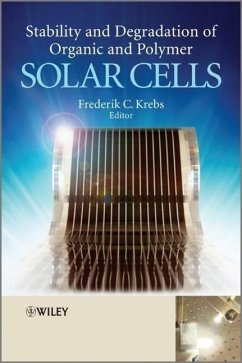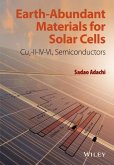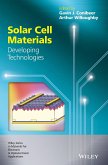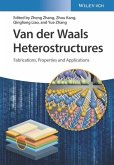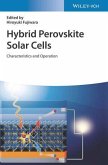Stability and Degradation of Organic and Polymer Solar Cells
Herausgegeben von Krebs, Frederik C.
Stability and Degradation of Organic and Polymer Solar Cells
Herausgegeben von Krebs, Frederik C.
- Gebundenes Buch
- Merkliste
- Auf die Merkliste
- Bewerten Bewerten
- Teilen
- Produkt teilen
- Produkterinnerung
- Produkterinnerung
Organic photovoltaics (OPV) are a new generation of solar cells with the potential to offer very short energy pay back times, mechanical flexibility and significantly lower production costs compared to traditional crystalline photovoltaic systems. A weakness of OPV is their comparative instability during operation and this is a critical area of research towards the successful development and commercialization of these 3rd generation solar cells.
Covering both small molecule and polymer solar cells, Stability and Degradation of Organic and Polymer Solar Cells summarizes the state of the art…mehr
Andere Kunden interessierten sich auch für
![Earth-Abundant Materials for Solar Cells Earth-Abundant Materials for Solar Cells]() Sadao AdachiEarth-Abundant Materials for Solar Cells176,99 €
Sadao AdachiEarth-Abundant Materials for Solar Cells176,99 €![Solar Cell Materials Solar Cell Materials]() Arthur WilloughbySolar Cell Materials180,99 €
Arthur WilloughbySolar Cell Materials180,99 €![Physical Chemistry of Semiconductor Materials and Processes Physical Chemistry of Semiconductor Materials and Processes]() Physical Chemistry of Semiconductor Materials and Processes91,99 €
Physical Chemistry of Semiconductor Materials and Processes91,99 €![2D Functional Nanomaterials 2D Functional Nanomaterials]() 2D Functional Nanomaterials162,00 €
2D Functional Nanomaterials162,00 €![Two-Dimensional Transition-Metal Dichalcogenides Two-Dimensional Transition-Metal Dichalcogenides]() Two-Dimensional Transition-Metal Dichalcogenides105,99 €
Two-Dimensional Transition-Metal Dichalcogenides105,99 €![Van der Waals Heterostructures Van der Waals Heterostructures]() Van der Waals Heterostructures149,00 €
Van der Waals Heterostructures149,00 €![Hybrid Perovskite Solar Cells Hybrid Perovskite Solar Cells]() Hybrid Perovskite Solar Cells205,00 €
Hybrid Perovskite Solar Cells205,00 €-
-
-
Organic photovoltaics (OPV) are a new generation of solar cells with the potential to offer very short energy pay back times, mechanical flexibility and significantly lower production costs compared to traditional crystalline photovoltaic systems. A weakness of OPV is their comparative instability during operation and this is a critical area of research towards the successful development and commercialization of these 3rd generation solar cells.
Covering both small molecule and polymer solar cells, Stability and Degradation of Organic and Polymer Solar Cells summarizes the state of the art understanding of stability and provides a detailed analysis of the mechanisms by which degradation occurs. Following an introductory chapter which compares different photovoltaic technologies, the book focuses on OPV degradation, discussing the origin and characterization of the instability and describing measures for extending the duration of operation.
Topics covered include:
Chemical and physical probes for studying degradation
Imaging techniques
Photochemical stability of OPV materials
Degradation mechanisms
Testing methods
Barrier technology and applications
Stability and Degradation of Organic and Polymer Solar Cells is an essential reference source for researchers in academia and industry, engineers and manufacturers working on OPV design, development and implementation.
Covering both small molecule and polymer solar cells, Stability and Degradation of Organic and Polymer Solar Cells summarizes the state of the art understanding of stability and provides a detailed analysis of the mechanisms by which degradation occurs. Following an introductory chapter which compares different photovoltaic technologies, the book focuses on OPV degradation, discussing the origin and characterization of the instability and describing measures for extending the duration of operation.
Topics covered include:
Chemical and physical probes for studying degradation
Imaging techniques
Photochemical stability of OPV materials
Degradation mechanisms
Testing methods
Barrier technology and applications
Stability and Degradation of Organic and Polymer Solar Cells is an essential reference source for researchers in academia and industry, engineers and manufacturers working on OPV design, development and implementation.
Produktdetails
- Produktdetails
- Verlag: Wiley & Sons
- 1. Auflage
- Seitenzahl: 360
- Erscheinungstermin: 23. April 2012
- Englisch
- Abmessung: 251mm x 172mm x 27mm
- Gewicht: 666g
- ISBN-13: 9781119952510
- ISBN-10: 1119952514
- Artikelnr.: 35889496
- Verlag: Wiley & Sons
- 1. Auflage
- Seitenzahl: 360
- Erscheinungstermin: 23. April 2012
- Englisch
- Abmessung: 251mm x 172mm x 27mm
- Gewicht: 666g
- ISBN-13: 9781119952510
- ISBN-10: 1119952514
- Artikelnr.: 35889496
Professor Frederik Krebs is based at the Riso National Laboratory for Sustainable Energy in Denmark where he is part of the Solar Energy Program. The aim of the program is to synthesize new materials for light harvesting and to optimize the structure of the solar cell with regards to energy conversion, stability and cost. Professor Krebs has been working in the field of polymer solar cells for over 10 years, focusing his efforts on the materials, manufacture and stability of solar cells. His research group are international pioneers, leading the way in their work on organic and polymeric solar cells. He has authored more than 200 publications, has written 2 books on organic photovoltaics (OPVs) and has hosted a conference on the stability of polymer solar cells (ISOS-3 International Summit on OPV Stabilty). He has also edited many journal special issues on organic photovoltaics, including one dedicated to their stability. In 2009, Professor Krebs received the Carlsberg Energy Research Prize in recognition of his work in polymer solar cells.
Preface xi Acknowledgements xiii List of Contributors xv 1. The Different
PV Technologies and How They Degrade 1 Frederik C. Krebs 1.1 The
Photovoltaic Effect and the Overview 1 1.2 The Photovoltaic Technologies 2
1.3 Intrinsic Versus Extrinsic Stability 3 1.3.1 Intrinsic Stability 3
1.3.2 Extrinsic Stability 3 1.4 Degradation - The Culprits, the What, the
Why and the How 3 1.5 Some Representative Technologies and How They Degrade
4 1.5.1 Mono- and Polycrystalline Silicon Solar Cells 5 1.5.2 Amorphous,
Micro- and Nanocrystalline Silicon Solar Cells 6 1.5.3 CIS/CIGS Solar Cells
8 1.5.4 CdS/CdTe Solar Cells 9 1.5.5 Dye-Sensitized Solar Cells (DSSC) 10
1.5.6 Organic and Polymer Solar Cells (OPV) 11 2. Chemical and Physical
Probes for Studying Degradation 17 Birgitta Andreasen and Kion Norrman 2.1
Introduction 17 2.2 Physical Probes 18 2.2.1 UV-vis Spectroscopy 18 2.2.2
Atomic Force Microscopy (AFM) 18 2.2.3 Interference Microscopy 20 2.2.4
Scanning Electron Microscopy (SEM) 21 2.2.5 Fluorescence Microscopy 23
2.2.6 Light-Beam Induced-Current Microscopy (LBIC) 24 2.2.7
Electroluminescence and Photoluminescence Imaging Microscopy (ELI and PLI)
25 2.2.8 X-ray Reflectometry 26 2.3 Chemical Probes 27 2.3.1 Infrared
Spectroscopy (IR) 27 2.3.2 Time-of-Flight Secondary Ion Mass Spectrometry
(TOF-SIMS) 28 2.3.3 X-ray Photoelectron Spectroscopy (XPS) 32 2.4 Summary
and Outlook 35 3. Imaging Techniques for Studying OPV Stability and
Degradation 39 Marco Seeland, Roland R¿osch and Harald Hoppe 3.1
Introduction to Imaging Techniques 39 3.1.1 Microscopy and Optical Scanning
39 3.1.2 Luminescence Imaging 40 3.1.3 Lock-In Thermography 43 3.1.4
Light-Beam Induced Current 45 3.2 Reports 46 3.2.1 Background: Degradation
of OLED Devices 46 3.2.2 Light-Beam Induced Current 50 3.2.3 Luminescence
Imaging 54 3.2.4 Optical Microscopy 57 3.2.5 Dark Lock-In Thermography and
LBIC 58 3.2.6 Dark Lock-In Thermography and Optical Scanning for Failure
Analysis 62 3.3 Discussion: Comparison of Imaging Techniques 63 3.4 Summary
66 4. Photochemical Stability of Materials for OPV 71 Matthieu Manceau,
Agnes Rivaton and Jean-Luc Gardette 4.1 Introduction 71 4.2 Methods 72
4.2.1 Aging Condition 72 4.2.1.1 Natural and Artificial Accelerated Aging
72 4.2.1.2 Temperature Effect 73 4.2.1.3 Atmosphere Composition 74 4.2.2
Degradation Monitoring 74 4.2.2.1 Spectroscopies 75 4.2.2.2 Microscopies 80
4.3 State-of-the-Art 82 4.3.1 Degradation of the pi-Conjugated Polymer 82
4.3.1.1 Study of the Pioneers: MDMO-PPV and P3HT 82 4.3.1.2 Material
Chemical Structure vs. Material Stability 90 4.3.2 Acceptor Material Aging
and Blend Degradation 99 4.3.2.1 Acceptor Degradation 99 4.3.2.2 Blend
Degradation 99 5. Degradation of Small-Molecule-Based OPV 109 Martin
Hermenau, Moritz Riede and Karl Leo 5.1 Comparison to Small-Molecule OLEDs
110 5.1.1 Number of Photoexcitations per Molecule 113 5.2 Comparison to
Polymer Solar Cells 115 5.2.1 Sensitivity to Air 115 5.2.2 Temperature
Stability 115 5.3 Small-Molecule Organic Materials 116 5.3.1 Active
Materials 116 5.3.1.1 Fullerene C60 116 5.3.1.2 Phthalocyanines 117 5.3.1.3
Pentacene 117 5.3.2 Transport- and Exciton-Blocking Materials 119 5.3.2.1
Electron-Transport Materials 119 5.3.2.2 Hole-Transport Materials 123 5.4
Degradation Conditions 125 5.4.1 Oxygen and Water 125 5.4.2 UV Radiation
132 5.5 State-of-the-Art in Lifetime Studies 134 5.6 Summary and Outlook
138 6. Degradation of Polymer-Based OPV 143 Mikkel Jørgensen and Frederik
C. Krebs 6.1 Focus on the Degradation and Stability of Polymer Solar Cells
143 6.2 A Chart of Degradation and Stability of Polymer Solar Cells 143 6.3
A Short Account of the OPV Stability/Degradation History 144 6.3.1 The
Divisions of Degradation Mechanisms 146 6.3.2 The Methodologies 148 6.4
Modus Operandi for Evolving OPV 148 6.5 The Recent Developments 149 6.5.1
The Photocatalytic Oxides 149 6.5.2 Interlayers 150 6.5.3 The Inverted
Structure 151 6.5.4 R2R Processing 152 6.5.5 Lamination and Encapsulation
153 6.5.6 Water Processing 154 6.5.7 Mechanical Degradation - Delamination
155 6.6 Interlaboratory Studies and Round Robins 156 6.7 Outside Studies
157 6.8 How Far Can OPV Be Taken in Terms of Stability 158 7. Test
Equipment for OPV Stability 163 Olivier Haillant 7.1 Introduction 163 7.2
Reliability and Durability Testing of PV Products 165 7.2.1 Reliability, a
Function of Durability 165 7.2.2 Environmental Durability 166 7.2.3
Durability and Weathering Testing 167 7.3 Laboratory Weathering Testing 168
7.3.1 Acceleration 168 7.3.2 Relevance 169 7.3.3 Precision 170 7.3.4
Introduction to Determination of Acceleration Factors 170 7.3.4.1
Acceleration of Photochemically and Thermally Activated Processes 171
7.3.4.2 Acceleration Related to Thermal Fatigue 171 7.4 Durability Testing
Techniques 172 7.4.1 Outdoor Weathering 172 7.4.1.1 Static and Dynamic
Outdoor Exposure 172 7.4.1.2 Accelerated Outdoor Exposure 174 7.4.1.3
Companies Servicing Outdoor Exposure 175 7.4.2 Laboratory Weathering 175
7.4.2.1 Introduction 175 7.4.2.2 Filtered xenon arc 178 7.4.2.3 Metal
Halide 179 7.4.3 Laboratory Photoaging 180 7.4.3.1 Mercury Arc 180 7.4.3.2
Fluorescent UV Lamps 181 7.4.4 Others 183 7.4.4.1 Light-Soaking Techniques
183 7.4.4.2 UV Concentrators 183 7.4.4.3 Carbon Arc 185 7.5 Conclusion 185
8. Characterization and Reporting of OPV Device Lifetime 193 Suren A.
Gevorgyan 8.1 Introduction 193 8.2 Photoelectric Characterization of OPV
Devices 194 8.2.1 Photoelectric Characterization Tools 194 8.2.2
Characterization in Controlled Environments 197 8.3 Interlaboratory Studies
of OPVs 202 8.3.1 Introduction 202 8.3.2 Interlaboratory Studies of
Flexible Large-Area Roll-to-Roll Processed Polymer Solar Cell Modules 203
8.3.3 Interlaboratory Stability Studies of OPVs 204 8.4 Lifetime Testing
and Reporting: Standardized Approach 213 8.4.1 Introduction 213 8.4.2
Procedures for Standard Lifetime Measurements 214 8.4.3 Reporting Lifetime
235 8.5 Conclusions 238 9. Concentrated Light for Organic Photovoltaics 243
By Thomas Tromholt 9.1 Introduction 243 9.2 Light-Concentration Setups 245
9.2.1 Refractive Sunlight Concentration 245 9.2.2 Reflective Sunlight
Concentration 246 9.2.3 Concentrated Solar Simulation 249 9.3 Experimental
Work Performed with Concentrated Light 251 9.3.1 IPV Response to
Concentrated Sunlight 251 9.3.2 Polymer Response to Concentrated Light 253
9.3.3 Organic Solar Cell Response to Concentrated Light 257 9.4 Physical
Characterization by Concentrated Sunlight 261 9.5 Conclusion 265 10.
Barrier Technology and Applications 269 Lars Muller-Meskamp, John Fahlteich
and Frederik Krebs 10.1 Encapsulation Requirements 269 10.1.1 Types of
Encapsulation 270 10.1.2 Glass/Glass Encapsulation 271 10.1.3 Lamination of
Barrier Films 272 10.1.4 Thin-Film Encapsulation 273 10.1.5 Perimeter
Sealing 273 10.2 Thin-Film Permeation Physics 274 10.2.1 Solid-State
Diffusion and Diffusion in Polymers 274 10.2.2 Fick's First Law of
Diffusion 275 10.2.3 Sorption 276 10.2.4 Permeation in Thin Films 277
10.2.5 Models for the Permeation-Coated Polymer Films 278 10.2.6
Temperature Dependence of Permeation 279 10.2.7 Dependence of Water
Permeation on Layer Thickness 280 10.2.8 Time Dependence of Permeation 282
10.2.9 Permeation in Multilayer Barriers 284 10.2.10 Pinholes in Multilayer
Systems 287 10.3 Measurement of Barrier Properties 288 10.3.1 Gravimetric
Cup 289 10.3.2 Carrier-Gas-Based Coulometric Barrier Measurement 289 10.3.3
Mass Spectrometer 290 10.3.4 Direct Pressure Measurement 291 10.3.5
Radioactive Isotopes 292 10.3.6 Calcium Test (Optical or Electrical) 293
10.3.7 Device Testing 294 10.3.8 Standards and Typical Measurement
Conditions 295 10.3.9 Test Method Overview 295 10.4 Barrier Technologies
295 10.4.1 Single-Layer Technologies 297 10.4.1.1 Reactive Evaporation 297
10.4.1.2 Magnetron Sputtering 298 10.4.1.3 Plasma-Assisted Chemical Vapor
Deposition (PECVD) 302 10.4.1.4 Atomic-Layer Deposition (ALD) 306 10.4.1.5
Summary of Single-Layer Technologies 309 10.4.2 Multilayer Technologies 309
10.5 Barrier Application in OPV 315 10.5.1 Products 316 10.5.2 Barrier Cost
and Manufacturability 318 10.6 Conclusion 321 References 322 11. Summary
and Outlook 331 Frederik C. Krebs Index 333
PV Technologies and How They Degrade 1 Frederik C. Krebs 1.1 The
Photovoltaic Effect and the Overview 1 1.2 The Photovoltaic Technologies 2
1.3 Intrinsic Versus Extrinsic Stability 3 1.3.1 Intrinsic Stability 3
1.3.2 Extrinsic Stability 3 1.4 Degradation - The Culprits, the What, the
Why and the How 3 1.5 Some Representative Technologies and How They Degrade
4 1.5.1 Mono- and Polycrystalline Silicon Solar Cells 5 1.5.2 Amorphous,
Micro- and Nanocrystalline Silicon Solar Cells 6 1.5.3 CIS/CIGS Solar Cells
8 1.5.4 CdS/CdTe Solar Cells 9 1.5.5 Dye-Sensitized Solar Cells (DSSC) 10
1.5.6 Organic and Polymer Solar Cells (OPV) 11 2. Chemical and Physical
Probes for Studying Degradation 17 Birgitta Andreasen and Kion Norrman 2.1
Introduction 17 2.2 Physical Probes 18 2.2.1 UV-vis Spectroscopy 18 2.2.2
Atomic Force Microscopy (AFM) 18 2.2.3 Interference Microscopy 20 2.2.4
Scanning Electron Microscopy (SEM) 21 2.2.5 Fluorescence Microscopy 23
2.2.6 Light-Beam Induced-Current Microscopy (LBIC) 24 2.2.7
Electroluminescence and Photoluminescence Imaging Microscopy (ELI and PLI)
25 2.2.8 X-ray Reflectometry 26 2.3 Chemical Probes 27 2.3.1 Infrared
Spectroscopy (IR) 27 2.3.2 Time-of-Flight Secondary Ion Mass Spectrometry
(TOF-SIMS) 28 2.3.3 X-ray Photoelectron Spectroscopy (XPS) 32 2.4 Summary
and Outlook 35 3. Imaging Techniques for Studying OPV Stability and
Degradation 39 Marco Seeland, Roland R¿osch and Harald Hoppe 3.1
Introduction to Imaging Techniques 39 3.1.1 Microscopy and Optical Scanning
39 3.1.2 Luminescence Imaging 40 3.1.3 Lock-In Thermography 43 3.1.4
Light-Beam Induced Current 45 3.2 Reports 46 3.2.1 Background: Degradation
of OLED Devices 46 3.2.2 Light-Beam Induced Current 50 3.2.3 Luminescence
Imaging 54 3.2.4 Optical Microscopy 57 3.2.5 Dark Lock-In Thermography and
LBIC 58 3.2.6 Dark Lock-In Thermography and Optical Scanning for Failure
Analysis 62 3.3 Discussion: Comparison of Imaging Techniques 63 3.4 Summary
66 4. Photochemical Stability of Materials for OPV 71 Matthieu Manceau,
Agnes Rivaton and Jean-Luc Gardette 4.1 Introduction 71 4.2 Methods 72
4.2.1 Aging Condition 72 4.2.1.1 Natural and Artificial Accelerated Aging
72 4.2.1.2 Temperature Effect 73 4.2.1.3 Atmosphere Composition 74 4.2.2
Degradation Monitoring 74 4.2.2.1 Spectroscopies 75 4.2.2.2 Microscopies 80
4.3 State-of-the-Art 82 4.3.1 Degradation of the pi-Conjugated Polymer 82
4.3.1.1 Study of the Pioneers: MDMO-PPV and P3HT 82 4.3.1.2 Material
Chemical Structure vs. Material Stability 90 4.3.2 Acceptor Material Aging
and Blend Degradation 99 4.3.2.1 Acceptor Degradation 99 4.3.2.2 Blend
Degradation 99 5. Degradation of Small-Molecule-Based OPV 109 Martin
Hermenau, Moritz Riede and Karl Leo 5.1 Comparison to Small-Molecule OLEDs
110 5.1.1 Number of Photoexcitations per Molecule 113 5.2 Comparison to
Polymer Solar Cells 115 5.2.1 Sensitivity to Air 115 5.2.2 Temperature
Stability 115 5.3 Small-Molecule Organic Materials 116 5.3.1 Active
Materials 116 5.3.1.1 Fullerene C60 116 5.3.1.2 Phthalocyanines 117 5.3.1.3
Pentacene 117 5.3.2 Transport- and Exciton-Blocking Materials 119 5.3.2.1
Electron-Transport Materials 119 5.3.2.2 Hole-Transport Materials 123 5.4
Degradation Conditions 125 5.4.1 Oxygen and Water 125 5.4.2 UV Radiation
132 5.5 State-of-the-Art in Lifetime Studies 134 5.6 Summary and Outlook
138 6. Degradation of Polymer-Based OPV 143 Mikkel Jørgensen and Frederik
C. Krebs 6.1 Focus on the Degradation and Stability of Polymer Solar Cells
143 6.2 A Chart of Degradation and Stability of Polymer Solar Cells 143 6.3
A Short Account of the OPV Stability/Degradation History 144 6.3.1 The
Divisions of Degradation Mechanisms 146 6.3.2 The Methodologies 148 6.4
Modus Operandi for Evolving OPV 148 6.5 The Recent Developments 149 6.5.1
The Photocatalytic Oxides 149 6.5.2 Interlayers 150 6.5.3 The Inverted
Structure 151 6.5.4 R2R Processing 152 6.5.5 Lamination and Encapsulation
153 6.5.6 Water Processing 154 6.5.7 Mechanical Degradation - Delamination
155 6.6 Interlaboratory Studies and Round Robins 156 6.7 Outside Studies
157 6.8 How Far Can OPV Be Taken in Terms of Stability 158 7. Test
Equipment for OPV Stability 163 Olivier Haillant 7.1 Introduction 163 7.2
Reliability and Durability Testing of PV Products 165 7.2.1 Reliability, a
Function of Durability 165 7.2.2 Environmental Durability 166 7.2.3
Durability and Weathering Testing 167 7.3 Laboratory Weathering Testing 168
7.3.1 Acceleration 168 7.3.2 Relevance 169 7.3.3 Precision 170 7.3.4
Introduction to Determination of Acceleration Factors 170 7.3.4.1
Acceleration of Photochemically and Thermally Activated Processes 171
7.3.4.2 Acceleration Related to Thermal Fatigue 171 7.4 Durability Testing
Techniques 172 7.4.1 Outdoor Weathering 172 7.4.1.1 Static and Dynamic
Outdoor Exposure 172 7.4.1.2 Accelerated Outdoor Exposure 174 7.4.1.3
Companies Servicing Outdoor Exposure 175 7.4.2 Laboratory Weathering 175
7.4.2.1 Introduction 175 7.4.2.2 Filtered xenon arc 178 7.4.2.3 Metal
Halide 179 7.4.3 Laboratory Photoaging 180 7.4.3.1 Mercury Arc 180 7.4.3.2
Fluorescent UV Lamps 181 7.4.4 Others 183 7.4.4.1 Light-Soaking Techniques
183 7.4.4.2 UV Concentrators 183 7.4.4.3 Carbon Arc 185 7.5 Conclusion 185
8. Characterization and Reporting of OPV Device Lifetime 193 Suren A.
Gevorgyan 8.1 Introduction 193 8.2 Photoelectric Characterization of OPV
Devices 194 8.2.1 Photoelectric Characterization Tools 194 8.2.2
Characterization in Controlled Environments 197 8.3 Interlaboratory Studies
of OPVs 202 8.3.1 Introduction 202 8.3.2 Interlaboratory Studies of
Flexible Large-Area Roll-to-Roll Processed Polymer Solar Cell Modules 203
8.3.3 Interlaboratory Stability Studies of OPVs 204 8.4 Lifetime Testing
and Reporting: Standardized Approach 213 8.4.1 Introduction 213 8.4.2
Procedures for Standard Lifetime Measurements 214 8.4.3 Reporting Lifetime
235 8.5 Conclusions 238 9. Concentrated Light for Organic Photovoltaics 243
By Thomas Tromholt 9.1 Introduction 243 9.2 Light-Concentration Setups 245
9.2.1 Refractive Sunlight Concentration 245 9.2.2 Reflective Sunlight
Concentration 246 9.2.3 Concentrated Solar Simulation 249 9.3 Experimental
Work Performed with Concentrated Light 251 9.3.1 IPV Response to
Concentrated Sunlight 251 9.3.2 Polymer Response to Concentrated Light 253
9.3.3 Organic Solar Cell Response to Concentrated Light 257 9.4 Physical
Characterization by Concentrated Sunlight 261 9.5 Conclusion 265 10.
Barrier Technology and Applications 269 Lars Muller-Meskamp, John Fahlteich
and Frederik Krebs 10.1 Encapsulation Requirements 269 10.1.1 Types of
Encapsulation 270 10.1.2 Glass/Glass Encapsulation 271 10.1.3 Lamination of
Barrier Films 272 10.1.4 Thin-Film Encapsulation 273 10.1.5 Perimeter
Sealing 273 10.2 Thin-Film Permeation Physics 274 10.2.1 Solid-State
Diffusion and Diffusion in Polymers 274 10.2.2 Fick's First Law of
Diffusion 275 10.2.3 Sorption 276 10.2.4 Permeation in Thin Films 277
10.2.5 Models for the Permeation-Coated Polymer Films 278 10.2.6
Temperature Dependence of Permeation 279 10.2.7 Dependence of Water
Permeation on Layer Thickness 280 10.2.8 Time Dependence of Permeation 282
10.2.9 Permeation in Multilayer Barriers 284 10.2.10 Pinholes in Multilayer
Systems 287 10.3 Measurement of Barrier Properties 288 10.3.1 Gravimetric
Cup 289 10.3.2 Carrier-Gas-Based Coulometric Barrier Measurement 289 10.3.3
Mass Spectrometer 290 10.3.4 Direct Pressure Measurement 291 10.3.5
Radioactive Isotopes 292 10.3.6 Calcium Test (Optical or Electrical) 293
10.3.7 Device Testing 294 10.3.8 Standards and Typical Measurement
Conditions 295 10.3.9 Test Method Overview 295 10.4 Barrier Technologies
295 10.4.1 Single-Layer Technologies 297 10.4.1.1 Reactive Evaporation 297
10.4.1.2 Magnetron Sputtering 298 10.4.1.3 Plasma-Assisted Chemical Vapor
Deposition (PECVD) 302 10.4.1.4 Atomic-Layer Deposition (ALD) 306 10.4.1.5
Summary of Single-Layer Technologies 309 10.4.2 Multilayer Technologies 309
10.5 Barrier Application in OPV 315 10.5.1 Products 316 10.5.2 Barrier Cost
and Manufacturability 318 10.6 Conclusion 321 References 322 11. Summary
and Outlook 331 Frederik C. Krebs Index 333
Preface xi Acknowledgements xiii List of Contributors xv 1. The Different
PV Technologies and How They Degrade 1 Frederik C. Krebs 1.1 The
Photovoltaic Effect and the Overview 1 1.2 The Photovoltaic Technologies 2
1.3 Intrinsic Versus Extrinsic Stability 3 1.3.1 Intrinsic Stability 3
1.3.2 Extrinsic Stability 3 1.4 Degradation - The Culprits, the What, the
Why and the How 3 1.5 Some Representative Technologies and How They Degrade
4 1.5.1 Mono- and Polycrystalline Silicon Solar Cells 5 1.5.2 Amorphous,
Micro- and Nanocrystalline Silicon Solar Cells 6 1.5.3 CIS/CIGS Solar Cells
8 1.5.4 CdS/CdTe Solar Cells 9 1.5.5 Dye-Sensitized Solar Cells (DSSC) 10
1.5.6 Organic and Polymer Solar Cells (OPV) 11 2. Chemical and Physical
Probes for Studying Degradation 17 Birgitta Andreasen and Kion Norrman 2.1
Introduction 17 2.2 Physical Probes 18 2.2.1 UV-vis Spectroscopy 18 2.2.2
Atomic Force Microscopy (AFM) 18 2.2.3 Interference Microscopy 20 2.2.4
Scanning Electron Microscopy (SEM) 21 2.2.5 Fluorescence Microscopy 23
2.2.6 Light-Beam Induced-Current Microscopy (LBIC) 24 2.2.7
Electroluminescence and Photoluminescence Imaging Microscopy (ELI and PLI)
25 2.2.8 X-ray Reflectometry 26 2.3 Chemical Probes 27 2.3.1 Infrared
Spectroscopy (IR) 27 2.3.2 Time-of-Flight Secondary Ion Mass Spectrometry
(TOF-SIMS) 28 2.3.3 X-ray Photoelectron Spectroscopy (XPS) 32 2.4 Summary
and Outlook 35 3. Imaging Techniques for Studying OPV Stability and
Degradation 39 Marco Seeland, Roland R¿osch and Harald Hoppe 3.1
Introduction to Imaging Techniques 39 3.1.1 Microscopy and Optical Scanning
39 3.1.2 Luminescence Imaging 40 3.1.3 Lock-In Thermography 43 3.1.4
Light-Beam Induced Current 45 3.2 Reports 46 3.2.1 Background: Degradation
of OLED Devices 46 3.2.2 Light-Beam Induced Current 50 3.2.3 Luminescence
Imaging 54 3.2.4 Optical Microscopy 57 3.2.5 Dark Lock-In Thermography and
LBIC 58 3.2.6 Dark Lock-In Thermography and Optical Scanning for Failure
Analysis 62 3.3 Discussion: Comparison of Imaging Techniques 63 3.4 Summary
66 4. Photochemical Stability of Materials for OPV 71 Matthieu Manceau,
Agnes Rivaton and Jean-Luc Gardette 4.1 Introduction 71 4.2 Methods 72
4.2.1 Aging Condition 72 4.2.1.1 Natural and Artificial Accelerated Aging
72 4.2.1.2 Temperature Effect 73 4.2.1.3 Atmosphere Composition 74 4.2.2
Degradation Monitoring 74 4.2.2.1 Spectroscopies 75 4.2.2.2 Microscopies 80
4.3 State-of-the-Art 82 4.3.1 Degradation of the pi-Conjugated Polymer 82
4.3.1.1 Study of the Pioneers: MDMO-PPV and P3HT 82 4.3.1.2 Material
Chemical Structure vs. Material Stability 90 4.3.2 Acceptor Material Aging
and Blend Degradation 99 4.3.2.1 Acceptor Degradation 99 4.3.2.2 Blend
Degradation 99 5. Degradation of Small-Molecule-Based OPV 109 Martin
Hermenau, Moritz Riede and Karl Leo 5.1 Comparison to Small-Molecule OLEDs
110 5.1.1 Number of Photoexcitations per Molecule 113 5.2 Comparison to
Polymer Solar Cells 115 5.2.1 Sensitivity to Air 115 5.2.2 Temperature
Stability 115 5.3 Small-Molecule Organic Materials 116 5.3.1 Active
Materials 116 5.3.1.1 Fullerene C60 116 5.3.1.2 Phthalocyanines 117 5.3.1.3
Pentacene 117 5.3.2 Transport- and Exciton-Blocking Materials 119 5.3.2.1
Electron-Transport Materials 119 5.3.2.2 Hole-Transport Materials 123 5.4
Degradation Conditions 125 5.4.1 Oxygen and Water 125 5.4.2 UV Radiation
132 5.5 State-of-the-Art in Lifetime Studies 134 5.6 Summary and Outlook
138 6. Degradation of Polymer-Based OPV 143 Mikkel Jørgensen and Frederik
C. Krebs 6.1 Focus on the Degradation and Stability of Polymer Solar Cells
143 6.2 A Chart of Degradation and Stability of Polymer Solar Cells 143 6.3
A Short Account of the OPV Stability/Degradation History 144 6.3.1 The
Divisions of Degradation Mechanisms 146 6.3.2 The Methodologies 148 6.4
Modus Operandi for Evolving OPV 148 6.5 The Recent Developments 149 6.5.1
The Photocatalytic Oxides 149 6.5.2 Interlayers 150 6.5.3 The Inverted
Structure 151 6.5.4 R2R Processing 152 6.5.5 Lamination and Encapsulation
153 6.5.6 Water Processing 154 6.5.7 Mechanical Degradation - Delamination
155 6.6 Interlaboratory Studies and Round Robins 156 6.7 Outside Studies
157 6.8 How Far Can OPV Be Taken in Terms of Stability 158 7. Test
Equipment for OPV Stability 163 Olivier Haillant 7.1 Introduction 163 7.2
Reliability and Durability Testing of PV Products 165 7.2.1 Reliability, a
Function of Durability 165 7.2.2 Environmental Durability 166 7.2.3
Durability and Weathering Testing 167 7.3 Laboratory Weathering Testing 168
7.3.1 Acceleration 168 7.3.2 Relevance 169 7.3.3 Precision 170 7.3.4
Introduction to Determination of Acceleration Factors 170 7.3.4.1
Acceleration of Photochemically and Thermally Activated Processes 171
7.3.4.2 Acceleration Related to Thermal Fatigue 171 7.4 Durability Testing
Techniques 172 7.4.1 Outdoor Weathering 172 7.4.1.1 Static and Dynamic
Outdoor Exposure 172 7.4.1.2 Accelerated Outdoor Exposure 174 7.4.1.3
Companies Servicing Outdoor Exposure 175 7.4.2 Laboratory Weathering 175
7.4.2.1 Introduction 175 7.4.2.2 Filtered xenon arc 178 7.4.2.3 Metal
Halide 179 7.4.3 Laboratory Photoaging 180 7.4.3.1 Mercury Arc 180 7.4.3.2
Fluorescent UV Lamps 181 7.4.4 Others 183 7.4.4.1 Light-Soaking Techniques
183 7.4.4.2 UV Concentrators 183 7.4.4.3 Carbon Arc 185 7.5 Conclusion 185
8. Characterization and Reporting of OPV Device Lifetime 193 Suren A.
Gevorgyan 8.1 Introduction 193 8.2 Photoelectric Characterization of OPV
Devices 194 8.2.1 Photoelectric Characterization Tools 194 8.2.2
Characterization in Controlled Environments 197 8.3 Interlaboratory Studies
of OPVs 202 8.3.1 Introduction 202 8.3.2 Interlaboratory Studies of
Flexible Large-Area Roll-to-Roll Processed Polymer Solar Cell Modules 203
8.3.3 Interlaboratory Stability Studies of OPVs 204 8.4 Lifetime Testing
and Reporting: Standardized Approach 213 8.4.1 Introduction 213 8.4.2
Procedures for Standard Lifetime Measurements 214 8.4.3 Reporting Lifetime
235 8.5 Conclusions 238 9. Concentrated Light for Organic Photovoltaics 243
By Thomas Tromholt 9.1 Introduction 243 9.2 Light-Concentration Setups 245
9.2.1 Refractive Sunlight Concentration 245 9.2.2 Reflective Sunlight
Concentration 246 9.2.3 Concentrated Solar Simulation 249 9.3 Experimental
Work Performed with Concentrated Light 251 9.3.1 IPV Response to
Concentrated Sunlight 251 9.3.2 Polymer Response to Concentrated Light 253
9.3.3 Organic Solar Cell Response to Concentrated Light 257 9.4 Physical
Characterization by Concentrated Sunlight 261 9.5 Conclusion 265 10.
Barrier Technology and Applications 269 Lars Muller-Meskamp, John Fahlteich
and Frederik Krebs 10.1 Encapsulation Requirements 269 10.1.1 Types of
Encapsulation 270 10.1.2 Glass/Glass Encapsulation 271 10.1.3 Lamination of
Barrier Films 272 10.1.4 Thin-Film Encapsulation 273 10.1.5 Perimeter
Sealing 273 10.2 Thin-Film Permeation Physics 274 10.2.1 Solid-State
Diffusion and Diffusion in Polymers 274 10.2.2 Fick's First Law of
Diffusion 275 10.2.3 Sorption 276 10.2.4 Permeation in Thin Films 277
10.2.5 Models for the Permeation-Coated Polymer Films 278 10.2.6
Temperature Dependence of Permeation 279 10.2.7 Dependence of Water
Permeation on Layer Thickness 280 10.2.8 Time Dependence of Permeation 282
10.2.9 Permeation in Multilayer Barriers 284 10.2.10 Pinholes in Multilayer
Systems 287 10.3 Measurement of Barrier Properties 288 10.3.1 Gravimetric
Cup 289 10.3.2 Carrier-Gas-Based Coulometric Barrier Measurement 289 10.3.3
Mass Spectrometer 290 10.3.4 Direct Pressure Measurement 291 10.3.5
Radioactive Isotopes 292 10.3.6 Calcium Test (Optical or Electrical) 293
10.3.7 Device Testing 294 10.3.8 Standards and Typical Measurement
Conditions 295 10.3.9 Test Method Overview 295 10.4 Barrier Technologies
295 10.4.1 Single-Layer Technologies 297 10.4.1.1 Reactive Evaporation 297
10.4.1.2 Magnetron Sputtering 298 10.4.1.3 Plasma-Assisted Chemical Vapor
Deposition (PECVD) 302 10.4.1.4 Atomic-Layer Deposition (ALD) 306 10.4.1.5
Summary of Single-Layer Technologies 309 10.4.2 Multilayer Technologies 309
10.5 Barrier Application in OPV 315 10.5.1 Products 316 10.5.2 Barrier Cost
and Manufacturability 318 10.6 Conclusion 321 References 322 11. Summary
and Outlook 331 Frederik C. Krebs Index 333
PV Technologies and How They Degrade 1 Frederik C. Krebs 1.1 The
Photovoltaic Effect and the Overview 1 1.2 The Photovoltaic Technologies 2
1.3 Intrinsic Versus Extrinsic Stability 3 1.3.1 Intrinsic Stability 3
1.3.2 Extrinsic Stability 3 1.4 Degradation - The Culprits, the What, the
Why and the How 3 1.5 Some Representative Technologies and How They Degrade
4 1.5.1 Mono- and Polycrystalline Silicon Solar Cells 5 1.5.2 Amorphous,
Micro- and Nanocrystalline Silicon Solar Cells 6 1.5.3 CIS/CIGS Solar Cells
8 1.5.4 CdS/CdTe Solar Cells 9 1.5.5 Dye-Sensitized Solar Cells (DSSC) 10
1.5.6 Organic and Polymer Solar Cells (OPV) 11 2. Chemical and Physical
Probes for Studying Degradation 17 Birgitta Andreasen and Kion Norrman 2.1
Introduction 17 2.2 Physical Probes 18 2.2.1 UV-vis Spectroscopy 18 2.2.2
Atomic Force Microscopy (AFM) 18 2.2.3 Interference Microscopy 20 2.2.4
Scanning Electron Microscopy (SEM) 21 2.2.5 Fluorescence Microscopy 23
2.2.6 Light-Beam Induced-Current Microscopy (LBIC) 24 2.2.7
Electroluminescence and Photoluminescence Imaging Microscopy (ELI and PLI)
25 2.2.8 X-ray Reflectometry 26 2.3 Chemical Probes 27 2.3.1 Infrared
Spectroscopy (IR) 27 2.3.2 Time-of-Flight Secondary Ion Mass Spectrometry
(TOF-SIMS) 28 2.3.3 X-ray Photoelectron Spectroscopy (XPS) 32 2.4 Summary
and Outlook 35 3. Imaging Techniques for Studying OPV Stability and
Degradation 39 Marco Seeland, Roland R¿osch and Harald Hoppe 3.1
Introduction to Imaging Techniques 39 3.1.1 Microscopy and Optical Scanning
39 3.1.2 Luminescence Imaging 40 3.1.3 Lock-In Thermography 43 3.1.4
Light-Beam Induced Current 45 3.2 Reports 46 3.2.1 Background: Degradation
of OLED Devices 46 3.2.2 Light-Beam Induced Current 50 3.2.3 Luminescence
Imaging 54 3.2.4 Optical Microscopy 57 3.2.5 Dark Lock-In Thermography and
LBIC 58 3.2.6 Dark Lock-In Thermography and Optical Scanning for Failure
Analysis 62 3.3 Discussion: Comparison of Imaging Techniques 63 3.4 Summary
66 4. Photochemical Stability of Materials for OPV 71 Matthieu Manceau,
Agnes Rivaton and Jean-Luc Gardette 4.1 Introduction 71 4.2 Methods 72
4.2.1 Aging Condition 72 4.2.1.1 Natural and Artificial Accelerated Aging
72 4.2.1.2 Temperature Effect 73 4.2.1.3 Atmosphere Composition 74 4.2.2
Degradation Monitoring 74 4.2.2.1 Spectroscopies 75 4.2.2.2 Microscopies 80
4.3 State-of-the-Art 82 4.3.1 Degradation of the pi-Conjugated Polymer 82
4.3.1.1 Study of the Pioneers: MDMO-PPV and P3HT 82 4.3.1.2 Material
Chemical Structure vs. Material Stability 90 4.3.2 Acceptor Material Aging
and Blend Degradation 99 4.3.2.1 Acceptor Degradation 99 4.3.2.2 Blend
Degradation 99 5. Degradation of Small-Molecule-Based OPV 109 Martin
Hermenau, Moritz Riede and Karl Leo 5.1 Comparison to Small-Molecule OLEDs
110 5.1.1 Number of Photoexcitations per Molecule 113 5.2 Comparison to
Polymer Solar Cells 115 5.2.1 Sensitivity to Air 115 5.2.2 Temperature
Stability 115 5.3 Small-Molecule Organic Materials 116 5.3.1 Active
Materials 116 5.3.1.1 Fullerene C60 116 5.3.1.2 Phthalocyanines 117 5.3.1.3
Pentacene 117 5.3.2 Transport- and Exciton-Blocking Materials 119 5.3.2.1
Electron-Transport Materials 119 5.3.2.2 Hole-Transport Materials 123 5.4
Degradation Conditions 125 5.4.1 Oxygen and Water 125 5.4.2 UV Radiation
132 5.5 State-of-the-Art in Lifetime Studies 134 5.6 Summary and Outlook
138 6. Degradation of Polymer-Based OPV 143 Mikkel Jørgensen and Frederik
C. Krebs 6.1 Focus on the Degradation and Stability of Polymer Solar Cells
143 6.2 A Chart of Degradation and Stability of Polymer Solar Cells 143 6.3
A Short Account of the OPV Stability/Degradation History 144 6.3.1 The
Divisions of Degradation Mechanisms 146 6.3.2 The Methodologies 148 6.4
Modus Operandi for Evolving OPV 148 6.5 The Recent Developments 149 6.5.1
The Photocatalytic Oxides 149 6.5.2 Interlayers 150 6.5.3 The Inverted
Structure 151 6.5.4 R2R Processing 152 6.5.5 Lamination and Encapsulation
153 6.5.6 Water Processing 154 6.5.7 Mechanical Degradation - Delamination
155 6.6 Interlaboratory Studies and Round Robins 156 6.7 Outside Studies
157 6.8 How Far Can OPV Be Taken in Terms of Stability 158 7. Test
Equipment for OPV Stability 163 Olivier Haillant 7.1 Introduction 163 7.2
Reliability and Durability Testing of PV Products 165 7.2.1 Reliability, a
Function of Durability 165 7.2.2 Environmental Durability 166 7.2.3
Durability and Weathering Testing 167 7.3 Laboratory Weathering Testing 168
7.3.1 Acceleration 168 7.3.2 Relevance 169 7.3.3 Precision 170 7.3.4
Introduction to Determination of Acceleration Factors 170 7.3.4.1
Acceleration of Photochemically and Thermally Activated Processes 171
7.3.4.2 Acceleration Related to Thermal Fatigue 171 7.4 Durability Testing
Techniques 172 7.4.1 Outdoor Weathering 172 7.4.1.1 Static and Dynamic
Outdoor Exposure 172 7.4.1.2 Accelerated Outdoor Exposure 174 7.4.1.3
Companies Servicing Outdoor Exposure 175 7.4.2 Laboratory Weathering 175
7.4.2.1 Introduction 175 7.4.2.2 Filtered xenon arc 178 7.4.2.3 Metal
Halide 179 7.4.3 Laboratory Photoaging 180 7.4.3.1 Mercury Arc 180 7.4.3.2
Fluorescent UV Lamps 181 7.4.4 Others 183 7.4.4.1 Light-Soaking Techniques
183 7.4.4.2 UV Concentrators 183 7.4.4.3 Carbon Arc 185 7.5 Conclusion 185
8. Characterization and Reporting of OPV Device Lifetime 193 Suren A.
Gevorgyan 8.1 Introduction 193 8.2 Photoelectric Characterization of OPV
Devices 194 8.2.1 Photoelectric Characterization Tools 194 8.2.2
Characterization in Controlled Environments 197 8.3 Interlaboratory Studies
of OPVs 202 8.3.1 Introduction 202 8.3.2 Interlaboratory Studies of
Flexible Large-Area Roll-to-Roll Processed Polymer Solar Cell Modules 203
8.3.3 Interlaboratory Stability Studies of OPVs 204 8.4 Lifetime Testing
and Reporting: Standardized Approach 213 8.4.1 Introduction 213 8.4.2
Procedures for Standard Lifetime Measurements 214 8.4.3 Reporting Lifetime
235 8.5 Conclusions 238 9. Concentrated Light for Organic Photovoltaics 243
By Thomas Tromholt 9.1 Introduction 243 9.2 Light-Concentration Setups 245
9.2.1 Refractive Sunlight Concentration 245 9.2.2 Reflective Sunlight
Concentration 246 9.2.3 Concentrated Solar Simulation 249 9.3 Experimental
Work Performed with Concentrated Light 251 9.3.1 IPV Response to
Concentrated Sunlight 251 9.3.2 Polymer Response to Concentrated Light 253
9.3.3 Organic Solar Cell Response to Concentrated Light 257 9.4 Physical
Characterization by Concentrated Sunlight 261 9.5 Conclusion 265 10.
Barrier Technology and Applications 269 Lars Muller-Meskamp, John Fahlteich
and Frederik Krebs 10.1 Encapsulation Requirements 269 10.1.1 Types of
Encapsulation 270 10.1.2 Glass/Glass Encapsulation 271 10.1.3 Lamination of
Barrier Films 272 10.1.4 Thin-Film Encapsulation 273 10.1.5 Perimeter
Sealing 273 10.2 Thin-Film Permeation Physics 274 10.2.1 Solid-State
Diffusion and Diffusion in Polymers 274 10.2.2 Fick's First Law of
Diffusion 275 10.2.3 Sorption 276 10.2.4 Permeation in Thin Films 277
10.2.5 Models for the Permeation-Coated Polymer Films 278 10.2.6
Temperature Dependence of Permeation 279 10.2.7 Dependence of Water
Permeation on Layer Thickness 280 10.2.8 Time Dependence of Permeation 282
10.2.9 Permeation in Multilayer Barriers 284 10.2.10 Pinholes in Multilayer
Systems 287 10.3 Measurement of Barrier Properties 288 10.3.1 Gravimetric
Cup 289 10.3.2 Carrier-Gas-Based Coulometric Barrier Measurement 289 10.3.3
Mass Spectrometer 290 10.3.4 Direct Pressure Measurement 291 10.3.5
Radioactive Isotopes 292 10.3.6 Calcium Test (Optical or Electrical) 293
10.3.7 Device Testing 294 10.3.8 Standards and Typical Measurement
Conditions 295 10.3.9 Test Method Overview 295 10.4 Barrier Technologies
295 10.4.1 Single-Layer Technologies 297 10.4.1.1 Reactive Evaporation 297
10.4.1.2 Magnetron Sputtering 298 10.4.1.3 Plasma-Assisted Chemical Vapor
Deposition (PECVD) 302 10.4.1.4 Atomic-Layer Deposition (ALD) 306 10.4.1.5
Summary of Single-Layer Technologies 309 10.4.2 Multilayer Technologies 309
10.5 Barrier Application in OPV 315 10.5.1 Products 316 10.5.2 Barrier Cost
and Manufacturability 318 10.6 Conclusion 321 References 322 11. Summary
and Outlook 331 Frederik C. Krebs Index 333

